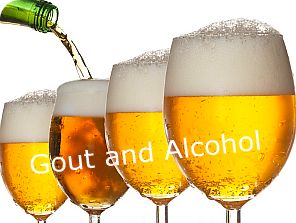Alcohol cited as risk factor for gout through glucose, apolipoprotein metabolism

Alcohol altered the risk for gout through glucose and apolipoprotein metabolism, according to a…
healio.com
Beer, Spirits Increase Gout Risk
As few as two to four beers a week may increase the…
webmd.com|By WebMD
Beer increases gout risk by over 200%, while liquor bumps it up by 60%, both in dose-dependent fashion. Red wine, in the recommended range of 1-2 table glasses a day, is neutral. Cheers!

Singaporean study also notes dietary intakes of soy and legumes may reduce risk.
medpagetoday.com
Despite shortcomings of a survey-based study fraught with patients’ dietary recall and diagnosis interpretation biases, the main take-home message is that: while total protein intake correlates with risk for gout, animal proteins are worse than plant proteins.
Attempts to dissect whether some animal proteins are more hazardous than others run into statistical absurdity (like fish and milk being significant only for women but not men), or being contradictory to conventional be…liefs or other observational studies (like fish and poultry are worse than red meat, or that diary is bad).
Attempts to dissect whether some animal proteins are more hazardous than others run into statistical absurdity (like fish and milk being significant only for women but not men), or being contradictory to conventional be…liefs or other observational studies (like fish and poultry are worse than red meat, or that diary is bad).
I also wouldn’t sweat it because, even if the associations were true (and it’s a super-duper “if”), the clinical significance is miniscule. The hazard ratio of the worse offender (poultry) is 1.27, while that of the surprising saint (legumes) is 0.83; risks hardly worth anyone’s effort to modify their diet.
Sugar has another bum rap — this time it’s in the joints.
medscape.com
Fructose Intake Associated With an Increased Risk for Gout in Women
Prospective data from the Nurses’ Health Study…
Fructose intake predisposes to the development of hyperuricaemia and gout in both men and women in a dose-dependent manner. Artificially-sweetened soft drinks were not associated with gout.
Lifestyle modification might improve ULT response in gout patients

Dyslipidemia, abdominal obesity, and alcohol consumption are associated with a poor response to urate-lowering therapy among patients with gout,…
medwirenews.com
